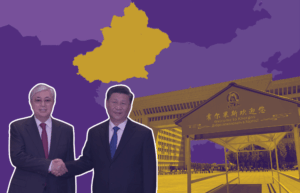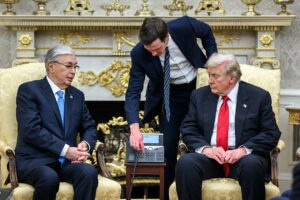Similar to last year, May 9 in Kazakhstan is overshadowed by Russia’s war in Ukraine. Military parades have been cancelled, once again. Instead, this year’s Victory Day will mainly be a day to remember Kazakhstan’s own participation in the Second World War.
For the fifth year in a row, there will be no military parade in May – neither on Defender of the Fatherland Day on 7 May, nor on Victory Day on 9 May, when the end of the Second World War is commemorated in parts of the former Soviet Union. Official sources cite budget cuts as the main reason.
However, May 9 remains a public holiday. Instead of a parade, the Kazakh Ministry of Defence plans to hold “military-patriotic events” to honour individual members of the armed forces. Kazakh soldiers killed in the war will be commemorated in the media and at public events.
In the context of Russia’s military aggression against Ukraine, Victory Day has become increasingly politicised, as the memory of the Second World War is heavily instrumentalised by the Kremlin. As a result, attention has shifted to Kazakhstan’s own commemoration of its participation in the war.
Friend, foe, or neighbour?
Last April, when the Kazakh Ministry of Defence announced that there would be no military parades in May, Russian TV host and propagandist Tigran Keosayan condemned the “Kazakh brothers” for being “ungrateful”.
“We understand that this is not about money. Right now, celebrating Victory Day is a ‘friend-foe’ recognition sign,” Keosayan said in a video on his YouTube channel. He reminded his viewers of Russia’s “gratuitous help” to “save your power in Kazakhstan and end your chaos”, referring to the deployment of Collective Security Treaty Organisation troops in Kazakhstan to quell the protests of January 2022. In response to his thinly veiled threats, Kazakhstan’s foreign ministry declared Keosayan an undesirable person.
Read more on Novastan: “An escalating manifestation of Russophobia” – Kazakhstan at the epicentre of an information war
Many Kazakhstanis, including politicians, supported this decision. “We side with countries that believe that Russia is an aggressor against Ukraine. We are not your little brother, not a brotherly nation. We are neighbours. Neighbours should respect each other. If you don’t respect us, we won’t respect you,” replied blogger and activist Togzhan Qoyaliyeva in a video message.
Saving money or ones image?
In fact, Kazakhstan has held only two military parades in 32 years of independence, in 2013 and 2018. “The cost savings are a formal excuse that does not generate additional controversy,” political scientist Gaziz Abishev tells Novastan. In relation to the overall budget, he says, the savings are not all that significant. As Defence Minister Ruslan Jaqsylyqov told the local branch of the Russian medium Sputnik, one parade costs about 4 billion tenge, or just over 8 million euros.
“We believe that in this situation […] it is best to deal with combat readiness and training of the armed forces,” he said. A statement that, according to Abishev, does not, however, indicate the preparation of actual military actions.
“Kazakhstan can rightfully call itself the victorious country of the Great Patriotic War and World War II. In 2023 (as well as in 2022), a military parade on May 9 […] against the backdrop of a bloody war between the two largest ethnic groups that won the war on the side of the Soviet Union can be considered inappropriate sabre-rattling,” Abishev explained on his Telegram channel. “The cancellation of the military parade is a kind of gesture of pacifism, a sign of protest against the war between [two of] the victorious nations.”
Read more on Novastan: Kazakhstan’s gradual divorce from Russia
At the same time, he added that the cancellation of the military parades does not mean that the holiday itself will be cancelled. Kazakhstan continues to cooperate with Moscow within the frameworks of the Eurasian Union and CSTO. In doing so, Astana strives towards breaking down trade barriers while aiding Russian businesses to circumvent sanctions. However, Kazakhstan is well aware of the risk of secondary sanctions by the West. That is why at the same time, the authorities try to distance themselves from the Kremlin, Abishev explained when asked by Novastan.
Supporting veterans
An integral part of Victory Day celebrations in many post-Soviet countries is honouring veterans. Between 1941 and 1945, more than 1.2 million Kazakhstanis were summoned to the front. Today there are only 222 war veterans alive, as well as 60 106 citizens who contributed to the victory in the Great Patriotic War, according to the news portal inform.kz.
Every year, the state increases veterans’ pensions and other social benefits, and pays a special allowance on Victory Day. This year, each war veteran is to receive no less than 1.5 million tenge (about 3 000 euros) from the state. Compared to other Central Asian countries, Kazakhstan offers the largest financial support for veterans.
In recent years, the so-called “Immortal Regiment” has become an integral part of Victory Day celebrations in Russia. This year, however, the event will be held in a different format because of security reasons, a co-organiser said. For instance, you can pin a veteran’s portrait on your car or on clothes. You could also change your avatar on your social networks, as well as tell friends and acquaintances about your heroes instead of bringing their photos on signboards to a march.
The Russian House in Almaty, one of the representative offices of the Russian International Cooperation Agency Rossotrudnichestvo, will also hold an “Immortal Regiment” rally online. Anyone can send information about “heroes” from their family to the Russian House email address by May 6, which will then publish the information via its social media on May 9.
Last year, the Kazakh government officially banned the “Immortal Regiment” march and proposed an online event instead. Representatives of veterans’ organisations proposed an analogous form of rally: “Batyrlarǵa taǵzym” (Kazakh for Bowing to the Heroes), carrying portraits of Kazakh war veterans. This initiative was immediately approved by the authorities.
This year, an online event called “Er esimi – el esinde” (Kazakh for: “The name of the hero in the nation’s memory”) was held. Kazakhstanis can share information about their ancestors who died in the Great Patriotic War and their heroic deeds on a specially created internet platform.
“Admittedly, the traditional form of the rally has always been fraught with certain risks for public safety,” said Murat Abdushkurov, chairman of the Almaty public association “Union of Veterans of the Afghanistan War”, at a press conference. In addition, street blockades in the centre of Almaty would cause inconvenience to residents.
A day of mourning and remembrance
Asem Zhapisheva, journalist and activist in the opposition movement “Oyan, Qazaqstan!” (Kazakh for: “Kazakhstan, wake up!”) is content with the government’s decision to scrap the parade for the fifth year in a row. “This is a very good decision, because the cult of militarism does not lead to anything good. Kazakhstan, with its multivectoral foreign policy, has no reason to show its teeth to the world, especially since we don’t have a big army either,” Zhapisheva said. “Victory Day should be celebrated as a day of mourning, a day of remembrance. War is not only about the dead soldiers, but also about the people who lost their loved ones and the people who lost their health on the labour front.”
Regarding the “Immortal Regiment”, the journalist commented that the Russian state had monopolised a seemingly good, private initiative and made it part of its propaganda machine in an endless war with the “West”. The “Batyrlarǵa taǵzym” action was also not unproblematic in that sense.
“Even when public associations act as organisers, it is still a state mandate, a lack of imagination. Our officials are constantly copying Russian decisions, from laws to public rallies. I believe that we should be independent of Russia. If it wasn’t copied by the Russian colleagues, I wouldn’t have any complaints,” Japisheva said.
For more news and analysis from Central Asia, follow us on Twitter, Facebook, Telegram, Linkedin or Instagram.
Written by Aizere Mailaisarova
From Almaty for Novastan.org
Translated by Anna Wilhelmi
Edited by Julian Postulart
 Kazakhstan: commemorating Victory Day without military parade
Kazakhstan: commemorating Victory Day without military parade 



